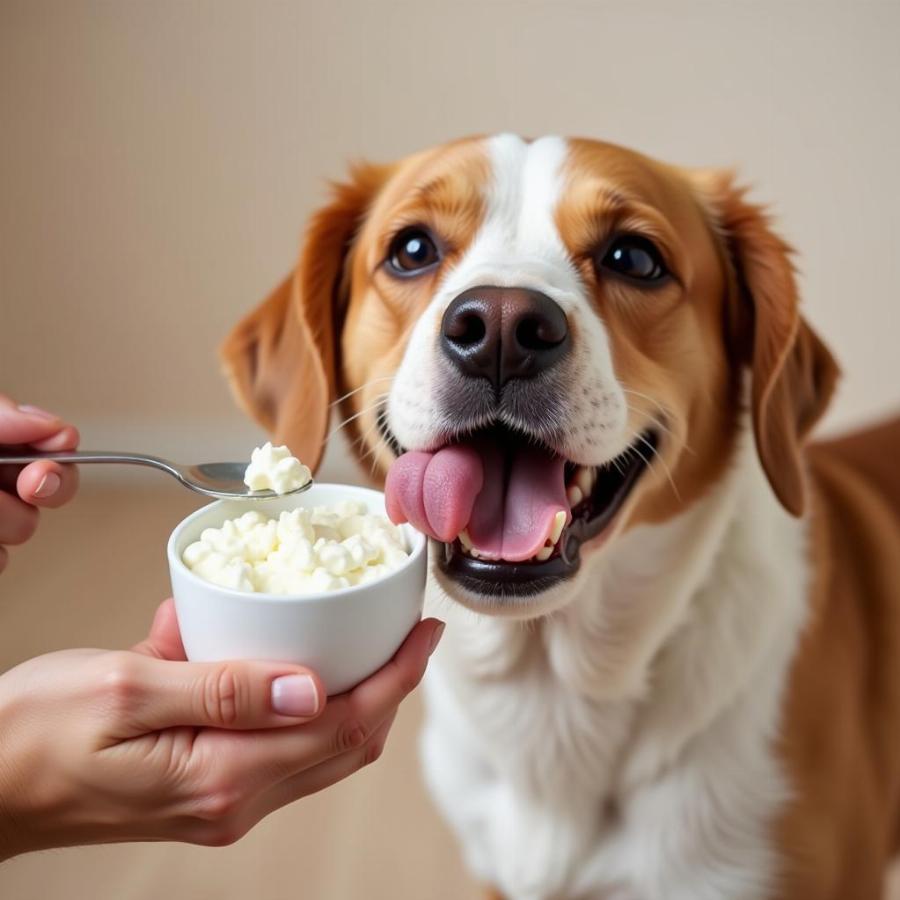Cheese can be a tempting treat for our canine companions, especially when they’re looking at us with those puppy dog eyes. But before you share your cheeseboard, it’s essential to understand the facts about dogs and cheese. While cheese isn’t entirely off-limits, there are important factors to consider regarding whether it’s a suitable snack for your furry friend.
Is Cheese Safe for Dogs?
The answer to whether dogs can eat cheese isn’t a simple yes or no. In moderation, certain types of cheese can be a safe and even beneficial treat for dogs. However, some cheeses are harmful and should be avoided altogether. Let’s break it down:
Cheeses Dogs Can Eat (in Moderation!)
- Low-Fat Cheeses: Opt for low-fat options like cottage cheese, mozzarella, or string cheese. These cheeses are lower in fat and lactose, making them easier for dogs to digest.
- Plain Cheeses: Stick to plain cheeses without added flavors like garlic, onion, or herbs. These additions can be toxic to dogs.
 Dog Enjoying Cottage Cheese
Dog Enjoying Cottage Cheese
Cheeses to Avoid Feeding Your Dog
- High-Fat Cheeses: Cheeses high in fat, like cheddar, brie, and parmesan, can lead to weight gain and pancreatitis in dogs.
- Blue Cheeses: Avoid blue cheeses like Roquefort, Stilton, and Gorgonzola. These cheeses contain a mold that can produce a toxin harmful to dogs.
- Cheese with Added Flavors: As mentioned earlier, cheeses with added garlic, onion, chives, or other herbs can be toxic to dogs.
Potential Benefits of Cheese for Dogs
While cheese should only be given in moderation, it can offer some potential benefits:
- High in Protein: Cheese is a good source of protein, which is essential for muscle growth and repair.
- Calcium Source: Cheese contains calcium, which is crucial for strong bones and teeth.
- Tasty Treat: Let’s face it; cheese can be a highly motivating and delicious treat for training or rewarding good behavior.
Risks and Considerations
While cheese can be a tasty treat, there are potential risks to be aware of:
- Lactose Intolerance: Like some humans, many dogs are lactose intolerant, meaning they have difficulty digesting lactose, the sugar found in dairy products. This can lead to digestive upset, including diarrhea, gas, and vomiting.
- High Fat Content: As mentioned, high-fat cheeses can contribute to weight gain and pancreatitis, a serious and potentially life-threatening condition.
- Sodium Content: Cheese can be high in sodium, which can be detrimental to dogs with heart or kidney conditions.
How to Feed Cheese to Your Dog Safely
If you choose to give your dog cheese, do so in moderation and follow these tips:
- Introduce Gradually: Start with a small amount of cheese to see how your dog tolerates it. Watch for any signs of digestive upset.
- Choose Wisely: Opt for low-fat, plain cheeses.
- Cut into Small Pieces: Cut cheese into small, bite-sized pieces to prevent choking hazards.
- Treat in Moderation: Cheese should only be an occasional treat and not a regular part of your dog’s diet.
- Consult Your Vet: If you have concerns about your dog’s diet or any underlying health conditions, talk to your veterinarian. They can provide personalized advice based on your dog’s needs.
FAQs about Dogs and Cheese
Here are some frequently asked questions about feeding cheese to dogs:
Can puppies eat cheese?
Puppies are more susceptible to lactose intolerance, so it’s best to avoid giving them cheese.
What should I do if my dog eats cheese and gets sick?
If your dog experiences vomiting or diarrhea after consuming cheese, discontinue feeding it and contact your veterinarian.
Can I give my dog cheese every day?
No, cheese should only be an occasional treat.
Is cheese a good source of nutrition for my dog?
While cheese contains some nutrients, it shouldn’t be considered a primary source of nutrition for your dog. A balanced and complete dog food should make up the majority of their diet.
Looking for More Dog Nutrition Tips?
Check out our articles on no hide dog chews and high protein for dogs for more information on providing a healthy and delicious diet for your furry friend.
Conclusion
In summary, dogs can eat some types of cheese in moderation. Always choose low-fat, plain cheese and avoid those with added flavors or mold. Introduce cheese gradually and watch for any adverse reactions. Remember, cheese should only be an occasional treat and not a staple in your dog’s diet.
Need More Advice?
Beaut Dogs is your go-to source for reliable and insightful information on all things dog-related. For personalized guidance and answers to your specific questions, don’t hesitate to contact our team at [email protected]. We’re here to help you navigate the world of dog ownership and ensure your furry friend lives a happy and healthy life. Visit Beaut Dogs today!